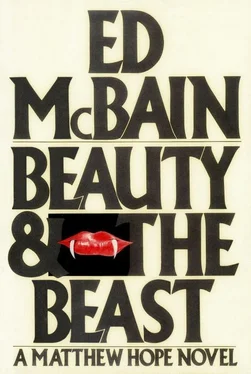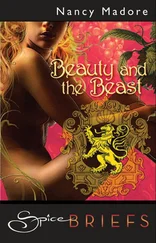“I’ve got it,” I said.
“Okay,” Willoughby said, and smiled, and extended his hand. “Good luck,” he said.
I had the feeling I was shaking hands with the devil.
By law, the State’s Attorney’s Office must supply to defense counsel the names and addresses of any witnesses it will call to testify at a trial. Even though I was getting an early start, I had no reason to believe that I’d have any trouble with them now. Whatever Willoughby’s opinion, there wasn’t a lawyer in town who did not believe that Skye Bannister — the unfortunate name with which the state’s attorney had been blessed — was anything but a fair and decent man sworn to uphold the laws of the state. A man in Bannister’s office immediately told me the name of Luther Jackson’s boat and the marina at which it was docked, and then threw into the pot as well the names and addresses of Lloyd Davis and Harper’s mother in Miami. Surprisingly, he wished me good luck before he hung up. Everybody was wishing me good luck today. I began thinking that maybe I would need it.
I did not get to the Sandy Pass Marina until a little after one o’clock that afternoon. I had called ahead to the marina office, but the man who answered the phone sounded dubious about getting a message to Jackson before my intended arrival. He told me he’d “try,” and in my experience anyone who tells me he’ll “try” is really intending to go out to lunch. But the boat (named Luther’s Hammer , presumably in reference to the protest nailed to the door of All Saints Church in Wittenberg in the year 1517) was there in one of the slips, and a man I presumed to be Jackson himself was squatting on the fantail, mending a fishing net. He looked up as I approached.
“Mr. Jackson?” I said.
“Yep,” he said.
“Matthew Hope. I’m representing George Harper, the man you—”
“Come aboard,” he said, and rose from where he was squatting. He was, I guessed, somewhere between sixty and seventy years old, a man whose face seemed eroded by sun, sea, and water, his nose bulbous and veined, his flinty blue eyes set deep in leathery weathered skin. He did not extend his hand. Instead, he reached for a pipe resting on the transom, shook the dottle out over the side, filled it with tobacco, and was lighting it as I stepped onto the deck.
“If you’re here to say I didn’t see him,” he said, “I seen him, and that’s that.”
“That’s what I’d like to talk about,” I said.
“You’ll be wasting your time.”
“It’s my time,” I said.
“And mine, too. I already spent close to two hours with the grand jury this morning, I don’t appreciate having to spend another two with you.”
“Mr. Jackson,” I said, “a man’s life is at stake here.”
“I ain’t about to change my mind about what I seen and heard. I already told this first to the police, and next to the grand jury. Ain’t no reason for me to go back on what I already said.”
“Except that when we subpoena you for deposition, you’ll have to tell us what you plan to say at the trial.”
“Who says?”
“That’s the law, Mr. Jackson. That’s what protects the innocent in this country.”
“Your man ain’t innocent,” Jackson said. “I seen him and I heard him. He’s the one killed her, all right.”
“In any case, can you tell me now what you think you saw or heard that night?”
“It ain’t what I think , Mr. Hope. It’s what I know .”
“And what’s that, exactly?”
“If you’re gonna get all this later in a deposition, why do you need it now?”
“Mr. Jackson, we’re spending more time arguing about talking than we’d be spending if we just plain talked .”
“Well, I suppose we are,” he said.
“So? Can I stop pulling teeth? I’m a lawyer by trade, not a dentist.”
Jackson smiled.
“Okay,” he said. “What do you want to know?”
“I want to know what you saw and heard on the night of the sixteenth. First, tell me what time this was.”
“Along around ten o’clock.”
“Where were you?”
“Anchored just off the beach.”
“On Whisper Key?”
“Yep. Heard the redfish were working in the shallows. Dropped the hook and put two lines over the side.”
“What kind of night was it?”
“Full moon, if you’re thinking I couldn’t see to the beach. Check the newspapers. They’ll tell you it was a full moon that night.”
“How far off were you anchored?”
“Just past the shallows. Maybe twenty feet from shore. No more’n that.”
“And you say you could see the beach clearly?”
“Clear as I’m seein you right this minute.”
“What exactly did you see, Mr. Jackson?”
“Black man and a white woman come runnin up the beach. The woman was naked.”
“What did she look like?”
“Long black hair, skin as pale as the moonlight.”
“And the man?”
“Big and husky. And black . Blackest nigger I ever seen in my life.”
I made a mental note to ask Luther Jackson, when we took his deposition, to discourse a bit on his attitudes about “niggers.” I also made a note to check with Morrie Bloom about the various shades of brown on the faces of the five policemen who’d been in the lineup with Harper; were any of them as black as he was? Or had Jackson made his identification based solely on how black Harper was?
“Did you see the man’s face?” I asked.
“I seen it, all right.”
“From twenty feet away?”
“My eyes are fine, Mr. Hope. If I can spot a school of fish three hundred yards off the bow, I can sure as hell see a man’s face from twenty feet offshore.”
“What kind of hair did he have?” I asked.
“Same as Harper’s.”
“What color were his eyes?”
“Couldn’t see his eyes. Most niggers have brown eyes, same as Harper’s.”
“When you say a big man...”
“Like Harper.”
“How tall would you say?”
“Like Harper.”
“How much did he weigh, would you guess?”
“Same as Harper.”
“Then there’s no question in your mind that the man you saw on the beach was George Harper.”
“None a’tall.”
“And you say you saw him at ten o’clock or thereabouts?”
“Around then. Him and the woman both. Was the woman first caught my eye, naked the way she was. Hard to see niggers in the dark, you know,” he said, and chuckled. I said nothing, but I made another mental note to ask him again, when we took his deposition, all about how difficult it was to see “niggers” in the dark.
“Did they just walk onto the beach, or what?” I said.
“Came runnin up the beach. Woman ahead of him, Harper following her.”
“Was she carrying anything?”
“Nothing that I saw.”
“No handbag, nothing like that?”
“Naked,” Jackson said, and nodded. “Big tits shining in the moonlight.”
I remembered that the police had found Michelle’s handbag in the sand, had in fact been able to make positive identification from the driver’s license in her wallet. It was the handbag that had led Morrie to believe she’d gone out onto the beach voluntarily. Had she dropped her bag on the sand near the pavilion before running from her murderer?
“How about him ? Was he carrying anything?”
“Who? Harper?”
“The man you saw running after her.”
“Nope. Nothin I could see.”
“How long had you been out on the water before you saw these people, Mr. Jackson?”
“Couple of hours. Left here around six-thirty, figure it took me forty minutes to get to Whisper. Let’s say I was there, anchored there with my lines in the water, since from about seven-thirty on.”
Читать дальше












